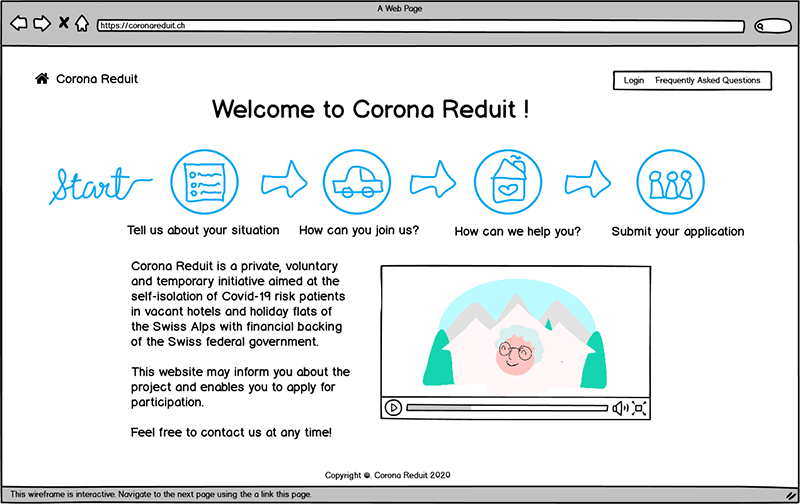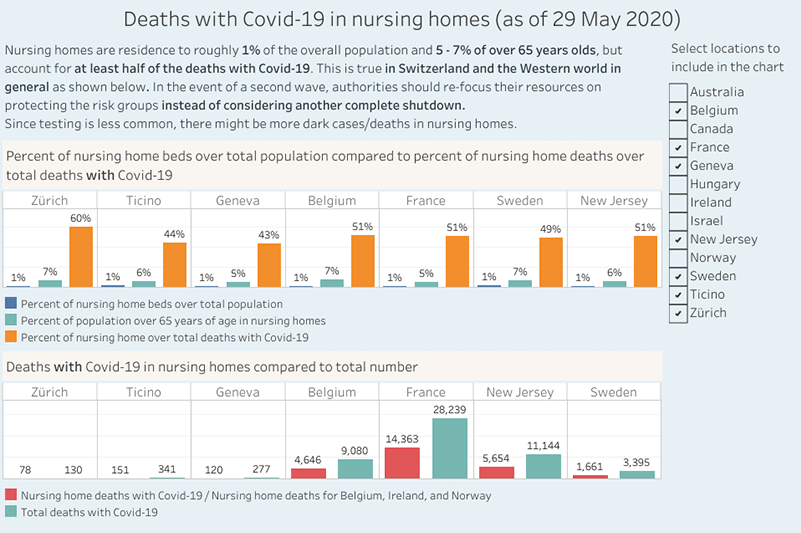Corona Reduit
Another general lockdown in a second wave is avoidable if risk persons can be protected individually. The isolation of risk persons in high population density areas is very challenging and yields a lot of undesired side effects. The low risk majority of the population sacrifices a lot for the risk groups. A voluntary temporary self-isolation of risk groups mitigates the problem for everybody.
Video
https://coronareduit.ch/2020/05/31/may-hackathon/
Description
Corona Reduit is a strategic concept to protect exposed risk persons. It might avoid another lockdown in case of a second wave of infections. We propose a private, voluntary and temporary self-isolation of Covid-19 risk patients in vacant hotels and holiday flats of the Swiss Alps. This resembles the iconic military reduits of the past. Its purpose is to keep the invisible enemy away from the weakest members of society until the worst is over. It’s about buying time and a more pronounced spread among low risk persons. The scope of the concept is strategic. Risk persons are more clearly identified now. Tailored measures are possible.
Technologies used
Tableau (dashboarding), surveymonkey (survey), Wordpress (website), Camtasia (video editing), Balsamiq (prototyping), Google trends (data sources), Apple mobility (data sources)
Accomplishments
Project website (https://coronareduit.ch) showing some deliverables. Regular updates are commencing. Providing solutions/indications for all major aspects of the concept: isolation/shielding of risk persons, identifying risk factors, scope of Swiss risk group, health improvement programs for risk persons, hygiene best practices, registration website prototype, economics of the lockdown with special focus on the hotel industry, financing of Corona Reduit, legal framework, network of stakeholders. All this is collected in a comprehensive 150+ page white paper that is still being worked on. Extensive analysis of risk groups and epidemiological data from conventional and innovative sources beyond common visualizations is a byproduct that was used by other hackathon participants/teams and scientists outside of the hackathon framework.
Obstacles
Lack of reliable data and standardization, especially on risk persons. Conflicting sources. Difficulty to promote the concept to relevant local and national stakeholders. Finding experts from different fields to review and provide feedback on our research and recommendations.
Learnings
1) Epidemiological situation There was and is no comprehensive Swiss public health strategy to protect risk groups in pandemics. Data acquisition, reporting and harvesting is not standardized at all. Available resources are not utilized to their potential. Governments have not been data driven in their decision making. Lack of reliable data minimizes the predictive value of epidemiological models. Google trend data for respiratory infection symptoms (fever, cough, headache, tiredness, shortness of breath) is a consistent early warning system for respiratory pandemic deaths by about 2-3 weeks. This is evident when combined with excess mortality data (euromomo). Switzerland is not an extraordinary case in terms of the dynamics of the pandemic. People have voluntarily practiced social distancing, regardless of government interventions. 2) Risk persons Shielding risk persons from infections lowers the death toll and capacity usage of the health care system. Tailored measures for risk persons might avoid another lockdown should a second wave occur. Roughly 50% of deaths with Covid-19 occur in nursing homes that only make up 1% of the population in countries all over the Western world. Nursing homes have always represented up about 50% of deaths of over 65-year-old persons in Switzerland in the timeframe 2010-2018. Excess mortality only occurred in the over 65 years old age group. The median age of death is 84 in Switzerland. Therefore, risk for severe Coivd-19 outcomes is extremely tilted towards senior citizens. Children are fortunately very rarely affected. Covid-19 risk factors are outlined in significant detail in the Covid-19 ordinance No. 2 Annex 6 of the Swiss federal government. It is unfortunate to place such important information hidden deeply in a legal document. We found that the list is too restrictive, inflexible, and incomplete. Individual doctor’s certifications of being at risk might be more appropriate. Certain risk conditions may be worked on in health improvement programs that include physical exercise, diet, supplementation, and fine tailoring of medications. Voluntary participation in preventative medicine studies might yield scientific discoveries. 3) Economic consequences of lockdown in general and for the hotel industry specifically Lockdowns are economically unsustainable and have negative health consequences. The global economy was turning down before the pandemic emerged. Many underlying economic conditions like overindebtedness and trade barriers have been supercharged by the lockdown. The lockdown, not “the virus”, has caused unprecedented market distortions. Demand will shift in patterns that are very difficult to predict. Estimates for worldwide international tourist arrivals by the World Tourism Organization (UNWTO) project a decline of at least 58% for 2020. This is unprecedented and dwarfs any previous crisis. This would equal a lost global tourism revenue of at least 910’000’000’000 US Dollars, more than 1% of global GDP. The Institute for Tourism of HES-SO Valais-Wallis estimates that the entire Swiss hotel industry will lose 1’700’000’000 to 2’700’000’000 CHF in revenue between March and June 2020. The Swiss hotel and tourism industry is suffering tremendously and will not recover quickly. Relying only on domestic visitors cannot make up for the absence of international demand whose share is usually above 50%. 25% of businesses see a significant risk of bankruptcy. 4) Realization of Corona Reduit We want to stress, though, that participation of both risk persons and hotels should be voluntary. Concepts resembling Corona Reduit were realized in parts of the USA, Canada, Japan, and South Africa. Hygiene requirements can be adopted from existing concepts for hotels, nursing homes, and hospitals. The biggest challenge are asymptomatic virus carriers. The Corona Reduit registration website should be low barrier and easy to use to facilitate access by seniors. The maximum potential savings for unemployment insurance not having to pay short-term work subsidies (“Kurzarbeit”) due to Corona Reduit is estimated to be 319’200’000 CHF over a period of 6 months. The project should be transferred to and strategized with Corona Reduit stakeholder associations: seniors, pre-existing conditions, hotels, tourism, and governmental bodies at all levels of the federal system (federal, canton, county).
Next steps
We will finish a detailed 150+ page white paper for decision-makers and stakeholders and transfer the concept to these. We are volunteers and will not accept any compensation for our efforts. Additionally, we will offer byproducts like risk person analyses and visualizations to interested parties.
Gallery
Sources
- httsp://coronareduit.ch
- https://coronareduit.ch/wp-content/uploads/2020/05/Corona-Reduit-presentation-may-hackathon-2.pdf
- https://coronareduit.ch/faq/
- https://coronareduit.ch/2020/05/28/dashboards/
- https://coronareduit.ch/2020/05/30/key-findings/
- https://coronareduit.ch/2020/05/31/summary-of-complex-challenges-and-solutions/
- https://coronareduit.ch/2020/05/31/public-policy-responses-to-covid-19/
- https://coronareduit.ch/2020/04/18/registration-website-prototype/
- https://coronareduit.ch/2020/04/25/corona-reduit-participation-survey2/

